Shaft Blu-ray Movie
HomeShaft Blu-ray Movie 
Warner Bros. | 2000 | 99 min | Rated R | Aug 13, 2013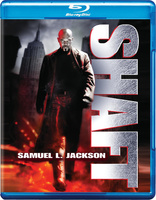
Movie rating
6.2 | / 10 |
Blu-ray rating
| Users | 4.0 | |
| Reviewer | 4.0 | |
| Overall | 4.0 |
Overview
Shaft (2000)
New York City police detective John Shaft (nephew of the original 1970s detective) goes on a personal mission to make sure the son of a real estate tycoon is brought to justice after a racially-motivated murder.
Starring: Samuel L. Jackson, Vanessa Williams (V), Jeffrey Wright, Christian Bale, Busta RhymesDirector: John Singleton
| Crime | Uncertain |
| Thriller | Uncertain |
| Action | Uncertain |
Specifications
Video
Video codec: MPEG-4 AVC
Video resolution: 1080p
Aspect ratio: 2.39:1
Original aspect ratio: 2.39:1
Audio
English: DTS-HD Master Audio 5.1 (48kHz, 24-bit)
French: Dolby Digital 5.1 (640 kbps)
Spanish: Dolby Digital 2.0
Subtitles
English SDH, French, Spanish
Discs
25GB Blu-ray Disc
Single disc (1 BD)
Playback
Region free
Review
Rating summary
| Movie | 4.0 | |
| Video | 4.0 | |
| Audio | 4.5 | |
| Extras | 2.0 | |
| Overall | 4.0 |
Shaft Blu-ray Movie Review
Still the Man, but Different
Reviewed by Michael Reuben August 11, 2013I'm far from the first one to point this out, but it's often overlooked that writer/director John Singleton's Shaft isn't a remake of the 1971 Gordon Parks classic. It's a sequel, in which Richard Roundtree reprises his role as private detective John Shaft and, almost thirty years later, is still the coolest guy around. When Roundtree's Shaft exits the Lenox Lounge for the night, he has a woman on each arm. In Singleton's original concept, Roundtree would have played a bigger role, teaming up with a new generation to fight injustice, but neither the studios nor producer Scott Rudin agreed, and it isn't hard to understand why. From the moment he first appeared in Parks's famous opening scene, Shaft was a loner, an urban gunslinger who strides into town and does things his way. It was his self-sufficient quality that made the character so dangerous and appealing. Singleton and co-writer Shane Salerno (Savages ) reconceived their story as the adventure of Shaft's nephew, also named John, who would be a lot like his uncle. As Singleton says in the extras, there are three essential elements to the character: a black leather coat, the signature Isaac Hayes theme and unmistakable cool. The first two were easy. For the third, Singleton settled on Samuel L. Jackson. Although Jackson and Singleton reportedly disagreed during shooting (and both fought with Rudin and screenwriter Richard Price), Jackson brought buckets of cool to the role, along with the distinctive brand of controlled menace that audiences first experienced when Jackson appeared as a Bible-quoting hit man in Pulp Fiction. Jackson's Shaft was just as smart as Roundtree's, but more volatile and quicker to anger, which made for an interesting dynamic in the scenes—too few, unfortunately—between uncle and nephew, when the older man counseled the younger to "step off". (Ironically, Roundtree is only six years older than Jackson, but Jackson looked good enough to play younger than his 52 years.) The country had changed so much in the three decades between the two films that Singleton, Salerno and Price were free to jettison novelist Ernest Tidyman's narrative and invent an entirely new story. The script underwent further changes during shooting and editing, as actor Jeffrey Wright (best known today as Felix Leiter to Daniel Craig's James Bond) virtually stole the picture as a flamboyant Dominican drug lord. Giving Wright more screen time as a villain meant cutting down the part played by Christian Bale's smug rich kid, including an elaborate fight sequence with Jackson that was Bale's main reason for taking the part in the first place. Such are the vagaries of filmmaking, but Shaft was unusual for the degree to which the participants talked about it even as the film hit theaters. Shaft did reasonably well at the box office, but it should have done better. With 20-20 hindsight, I suspect that Shaft would sold more tickets if the marketing campaign had played up the sequel angle instead of leaving the impression that the new film was a remake. Too many fans of the original thought it shouldn't have been remade, but those in the know couldn't overlook the cameo by the late Gordon Parks, director of the 1971 film, who gave Singleton's project his blessing.
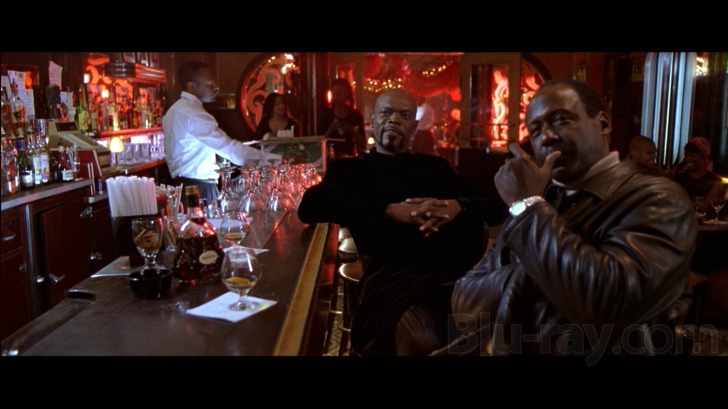
Unlike his uncle (Roundtree), this John Shaft (Jackson) joined the NYPD and rose to the rank of detective. As the film opens, he is standing over the body of a dying young black man, Trey Howard (Mekhi Phifer), whose skull was fractured outside an upscale midtown night spot where Trey was out for the evening with friends. Trey's date, Ivy (Catherine Kellner), tearfully recounts an altercation with a drunken rich kid, Walter Wade, Jr. (Bale), who hassled them with racial slurs. But no one saw what happened outside when Trey left the bar to cool off. Or maybe someone did. Shaft spots a bartender, Diane Palmieri (Toni Colette), who has blood on her face, and she flicks her eyes in the direction of Wade, who literally has blood on his hands. Shaft arrests Wade, eliciting the classic line: "Do you know who my father is?"—as it happens, he's a real estate tycoon (Philip Bosco)—but Diane flees the scene in terror. Shaft begins to understand her fear when he finds her driver's license in Wade's wallet with a bloody fingerprint on it. Wade is arrested for Trey's murder but quickly makes bail, which he immediately jumps, fleeing the country. Trey's grieving mother (Lynne Thigpen) is devastated, but Shaft promises her justice—someday. Two years later, Shaft is working narcotics uptown, having made himself unwelcome in his old precinct for his rough handling of Walter Wade, Jr. His team leader is Carmen Vasquez (Vanessa Williams, convincingly deglammed), and his colleagues include Roselli (Dan Hedaya), Groves (Ruben Santiago-Hudson) and Luger (Lee Tergesen). Their nemesis is the local drug lord, "Peoples" Hernandez (Wright), so known because he takes cares of "my peoples". Shaft being Shaft, he can't resist picking a quarrel with Peoples, whose hot temper makes him an easy mark. This gives Shaft a chance to arrest the kingpin for assaulting an officer, which is about the only crime for which Shaft can nail Peoples at this point. As luck would have it, however, Walter Wade, Jr. chooses just this moment to pop up on Shaft's radar. (Though it's never said directly, we are supposed to assume that Shaft has eyes and ears watching for him constantly.) Shaft intercepts Wade's private plane at Westchester Airport and throws the unrepentant killer in jail overnight, right next to Peoples Hernandez, thereby creating an unholy alliance. These two can't stand each other, but they can use each other. Peoples wants an upscale distributor for his drugs; Wade wants someone to find (and kill) Diane Palmieri, the only eyewitness to his murder, who has managed to remain underground since she ran out of the bar that night two years ago. The second half of Shaft has a frenetic quality as Singleton juggles half a dozen plot strands that keep twisting and looping back on each other. There's Shaft's search for Diane, the efforts of the Palmieri family to shield her, Peoples' determination to expand his empire, Wade's attempt to take out a contract on Diane, a couple of dirty cops, a scam involving a robbery—and did I mention that Shaft resigns from the NYPD? Consciously or not, another film from 1971 seems to have influenced Singleton besides the original Shaft, and that's Don Siegel's Dirty Harry. Like Harry, this Shaft committed himself to law enforcement but gradually concludes that justice and "the system" have parted ways. In a memorable, CGI-assisted scene, Shaft hurls away his detective's badge, just as Harry Callahan did, only Shaft hurls it directly at a judge who has made what Shaft considers a bad ruling. (In a stroke of ironic casting, the judge is played by Pat Hingle, who was Commissioner Gordon in Tim Burton's Batman .) By the end of Shaft, justice has prevailed, but only after a lot of gunplay and a crunching car chase. Shaft's image of the legal system is a bleak one, in which justice is a matter of money, regardless of whether it comes from real estate or drugs, and whether you speak with a cultured accent like Wade or a heavily accented one like Peoples. Ordinary people like Trey Howard's mother have to depend on other means, which is why, at the end of Shaft, Uncle John has finally acquired that younger partner he's been seeking for so long.
Shaft Blu-ray Movie, Video Quality 
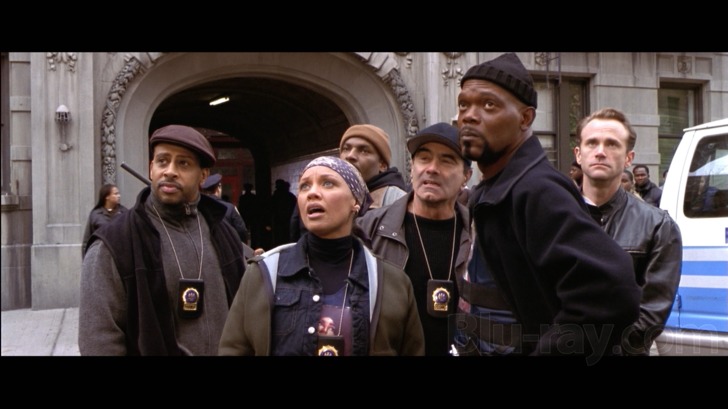
Shaft was one of the last features shot by Donald E. Thorin before his retirement, and it combined many elements from Thorin's varied resume, including action (e.g., Tango & Cash), film noir (Against All Odds) and, perhaps most importantly, a feel for musical rhythms (Purple Rain). The production shot in practical locations all over New York City and New Jersey, and Thorin had the challenge of lighting all of them, sometimes for day, sometimes for night. The image on Paramount/Warner's 1080p, AVC-encoded Blu-ray looks almost as if it was taken from a digital intermediate, even though Shaft was completed photochemically. In transferring the film for Blu-ray, Paramount (which does the transfers for its Warner-released Blu-ray product) seems to have decided to approach Shaft as if it were a new release, giving it the kind of digital polish and shine that is typical of films released today. This isn't necessarily the wrong approach for Shaft, which Singleton wanted to look as contemporary and "cool" as possible and which was shot in New York at the height of its glittery Nineties prosperity. But the Shaft on this Blu-ray has a virtually grainless surface that was almost impossible to obtain in 2000, and in that sense it doesn't look quite like the original. The difference is minute and will probably be lost on most viewers, but it struck me enough to be worth pointing out. The DI-style processing, however, has not come at the expense of image detail, which is excellent. (It helps that the source material appears to be in pristine condition.) The image is equally good at capturing the stubble on the various police officers, the shine of Shaft's various leather coats and the stains on Peoples Hernandez's "Egyptian cotton" threads when Shaft makes him spill his noodles down the front of his shirt. The grit and grime of Washington Heights streets are just as visible as the rich decor of the Lenox Lounge, where Shaft celebrates (prematurely as it turns out) his apprehension of Walter Wade, Jr. The film's varied color palette has been accurately reproduced, so that we get everything from the the rich luster of New York night spots, to the sun-bleached hues of the craft in the boatyard near Diane Palmieri's house to the dreary institutional tones of the lock-up where Peoples and Wade first meet. The blacks, of course, are solid and well-rendered. Shaft's coats demand no less. There's minor sharpening in some scenes. (I sometimes see it in the theater on DI-finished films as well.) Otherwise, artifacts did not appear, and I was surprised to discover an average bitrate of 18.91 Mbps, which seemed unusually low for a film with this much action. Somehow, though, they got away with it.
Shaft Blu-ray Movie, Audio Quality 
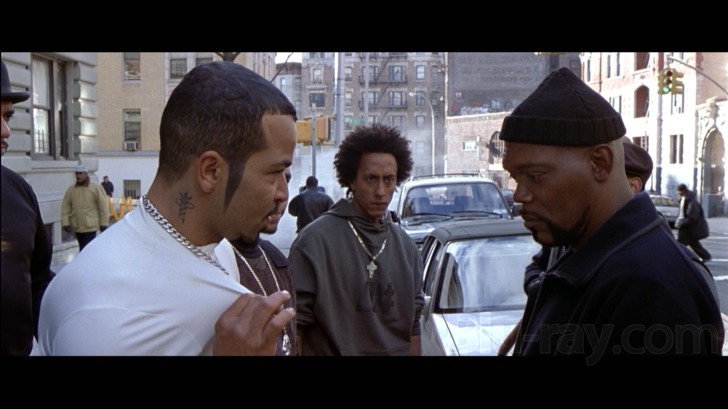
From the moment Isaac Hayes's signature theme kicks in, you know that (a) this is Shaft, and (b) this is a new film. Isaac Hayes revisited, reworked and remixed his Oscar-winning song with obvious care and attention to preserve what made it effective in the first place. But the 1971 mix was designed for radio play, with all the sounds folded into a single layer. For 2000, Hayes used all the resources of the discrete multi-track format to separate out his vocals, the chorus and the various instruments so that they could heard with a distinctness and clarity that wasn't possible outside a recording studio in 1971. In a properly calibrated system, the individual elements of Hayes's mix can be heard individually as they come from left, right and center and meet in the airy center of the listening space to create the essence of Shaft. On the Blu-ray's superb DTS-HD MA 5.1 track, the effect is even more pronounced than it was in the theater. The main musical score was composed by David Arnold, who has generally been faithful to the spirit of Hayes's theme and the style of his score for the 1971 film. Bass extension is powerful, so that either a subwoofer or full-range main speakers are essential. Dialogue is clearly rendered, which is critical given some of the vocal curlicues that Jeffrey Wright puts on his dialogue as Peoples Hernandez and the muttered curses by Busta Rhymes as Shaft's unwilling helper, Rasaan. Gunshots, blows with fists and other objects, and various vehicle collisions register with solid impact. Discrete rear effects aren't a major factor in the sound mix, but you're always aware of the city surrounding you.
Shaft Blu-ray Movie, Special Features and Extras 
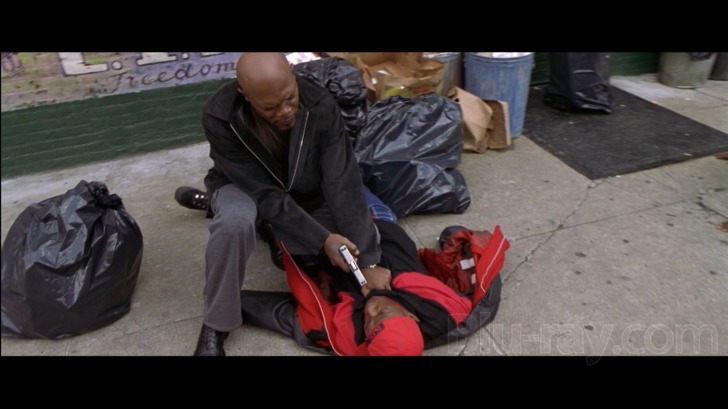
The extras have been ported over from Paramount's 2000 DVD. Omitted are two music videos: "Theme from Shaft" by Isaac Hayes; and "Bad Man" by R. Kelly.
- Reflections on Shaft (480i; 1.33:1; 13:22): This featurette consists of interviews with Singleton and the cast talking about the film and their experiences of making it. The interviews appear to have been conducted after production.
- Shaft: Still the Man (480i; 1.33:1; 16:21): This featurette covers much of the same ground and includes most of the same participants, but the interviews were clearly done during filming.
- Theatrical Trailer (480i; 1.78:1, enhanced; 2:23): It's a stylish trailer with footage shot exclusively for promotional purposes. Watch carefully, and you can see a few quick cuts of the deleted fight scene between Jackson's Shaft and Bale's Walter Wade, Jr.
Shaft Blu-ray Movie, Overall Score and Recommendation 
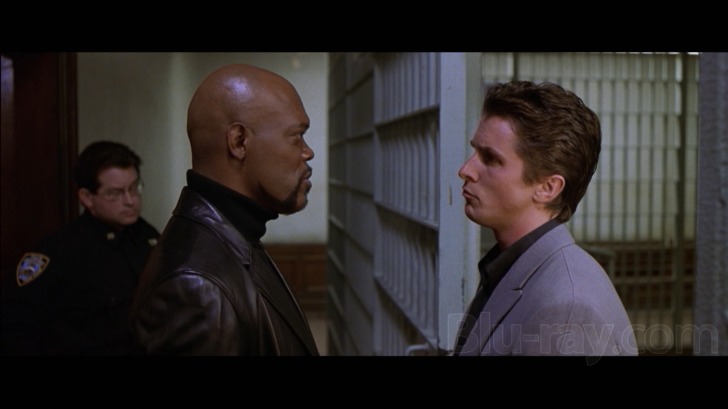
Singleton reportedly wanted to make a sequel to his Shaft, but Jackson wasn't interested and the film wasn't so successful that demand was overwhelming. I've always thought highly of Singleton's Shaft, and this Blu-ray confirmed my evaluation, but it may be that the character's iconic status is inseparable from the era in which he first appeared. An African-American hero of such boldness and charisma in a mainstream film was so much a novelty in 1971 that audiences were blown away (and not always comfortable with the experience). By 2000, Shaft had a lot of competition. Still, Jackson and Singleton were an interesting pairing, especially with Wright and Bale in the mix. Highly recommended.
Similar titles
Similar titles you might also like

Superfly
2018

The Boondock Saints
20th Anniversary Edition
2000

Four Brothers
2005

New Jack City
1991

The Enforcer
The Dirty Harry Collection
1976

Machete
2010

Original Gangstas
1996

Next of Kin
1989

Sudden Impact
The Dirty Harry Collection
1983

The Dead Pool
The Dirty Harry Collection
1988

The Boondock Saints II: All Saints Day
Director's Cut
2009

Falling Down
1993

Harry Brown
2009

Good People
2014

The Equalizer: The Complete Series
1985-1989

Gangster Squad
2013

Hawaii Five-0: Seasons 1-3
2010-2013

Shaft
1971

16 Blocks
2006

Training Day 4K
2001

